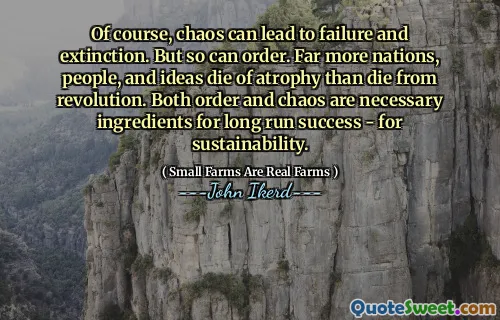
Of course, chaos can lead to failure and extinction. But so can order. Far more nations, people, and ideas die of atrophy than die from revolution. Both order and chaos are necessary ingredients for long run success - for sustainability.
This quote illuminates a profound truth about the dynamics between order and chaos in the context of growth, sustainability, and success. It challenges the binary perception that chaos is inherently destructive while order is necessarily constructive. In reality, both extremes can lead to negative outcomes if they exist in isolation. Chaos, with its unpredictable and often violent disruptions, can cause failure and even extinction. However, unbridled order can lead to stagnation, where the lack of innovation, adaptation, and change causes systems, societies, or ideas to wither away from complacency or atrophy.
The assertion that "far more nations, people, and ideas die of atrophy than die from revolution" is particularly striking. It suggests that gradual decay—a slow death through absence of renewal—is often more detrimental than swift upheaval. This is a vital reminder that growth and sustainability require a delicate balance, a dynamic tension between stability and change.
From an ecological, social, or organizational perspective, both order and chaos fluctuate in natural cycles. Order provides structure, security, and continuity, which are essential for building infrastructure and preserving culture. Chaos, on the other hand, fosters creativity, evolution, and radical transformation which allow new possibilities and improvements to emerge.
In the broader narrative of sustainability, especially relating to farming, economies, or ecosystems, this idea resonates deeply. Sustainable practices often emerge from the tension between maintaining necessary frameworks while remaining flexible enough to innovate and respond to changing conditions. In short, the quote advocates embracing complexity—the blend of order and chaos—for long-term success rather than seeking an unrealistic dominance of one over the other.






